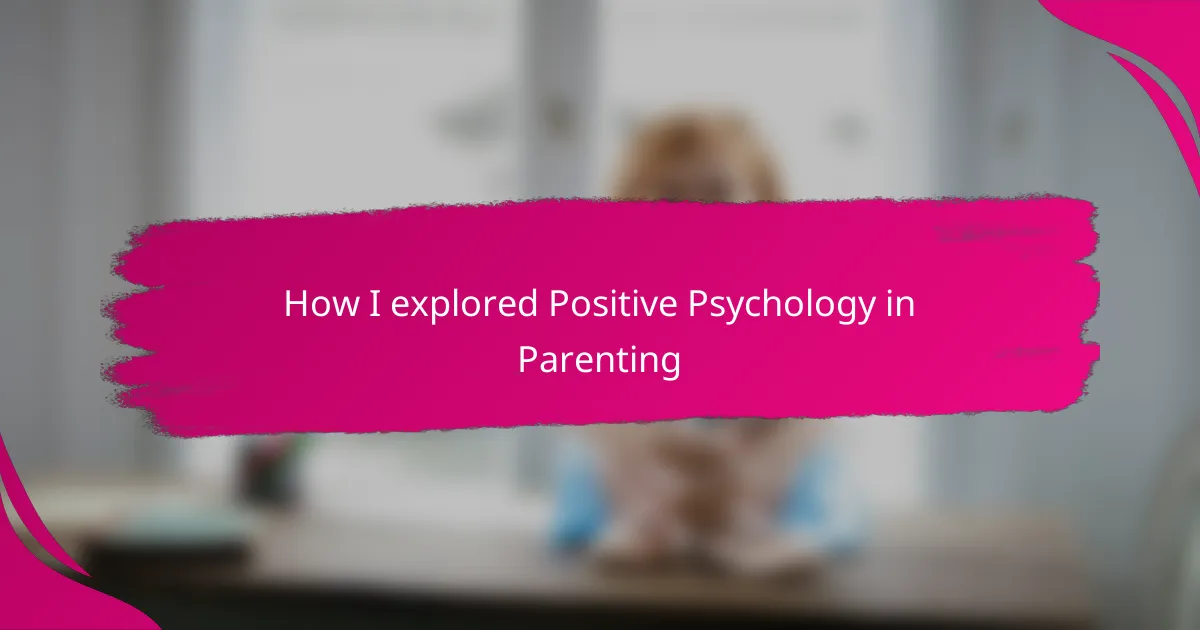Key takeaways
- Positive psychology emphasizes nurturing strengths and cultivating gratitude, improving family interactions and emotional connections.
- Focusing on strengths boosts children’s confidence and resilience, helping them view setbacks as learning experiences rather than failures.
- Implementing daily practices, such as acknowledging efforts and discussing positives, creates a supportive home environment and fosters growth.
- Consistency, patience, and community support are crucial for sustaining positive parenting practices and nurturing a positive mindset.
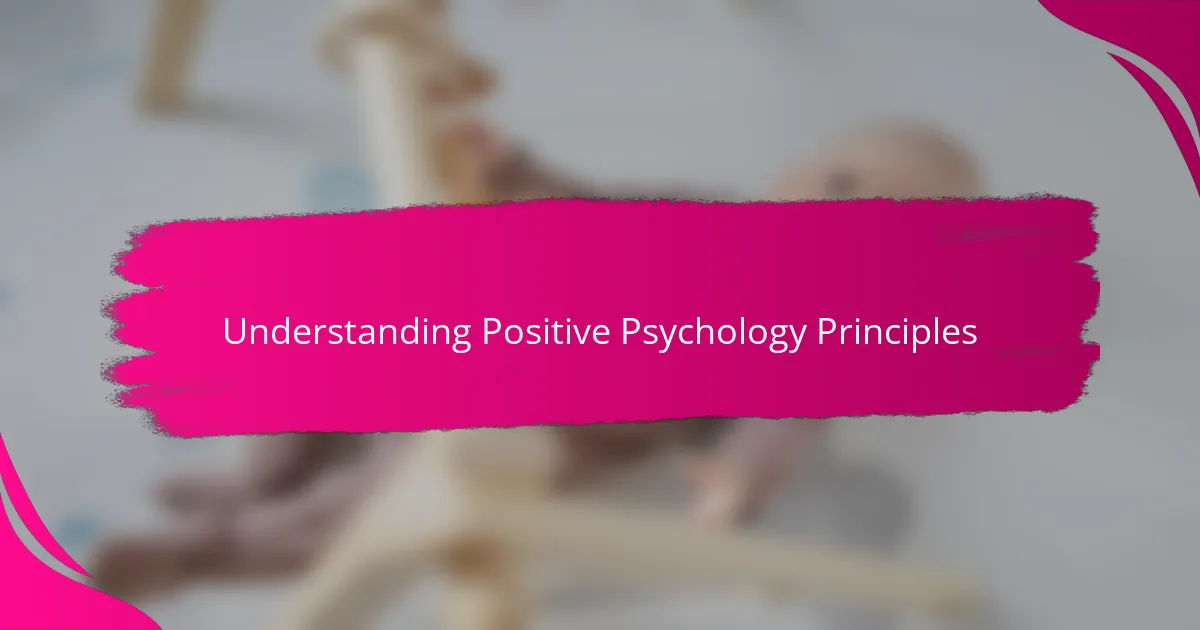
Understanding Positive Psychology Principles
Positive psychology, at its core, focuses on what makes life worth living, emphasizing strengths rather than weaknesses. When I first encountered this approach, it made me question: What if, instead of constantly correcting my child’s mistakes, I highlighted their efforts and successes? This shift in focus felt refreshing and opened up new ways to nurture their growth.
One principle that resonated deeply with me is the idea of cultivating gratitude. I started simple—encouraging my child to recognize small joys each day. This practice didn’t just change their outlook; it transformed our interactions, bringing more warmth and connection into our daily routine.
Have you ever noticed how positive emotions can ripple through a family like wildfire? Understanding that positive psychology isn’t about ignoring challenges but building resilience helped me reframe difficult moments. It’s not always easy, but embracing this mindset has made parenting feel less like a battle and more like a shared journey.
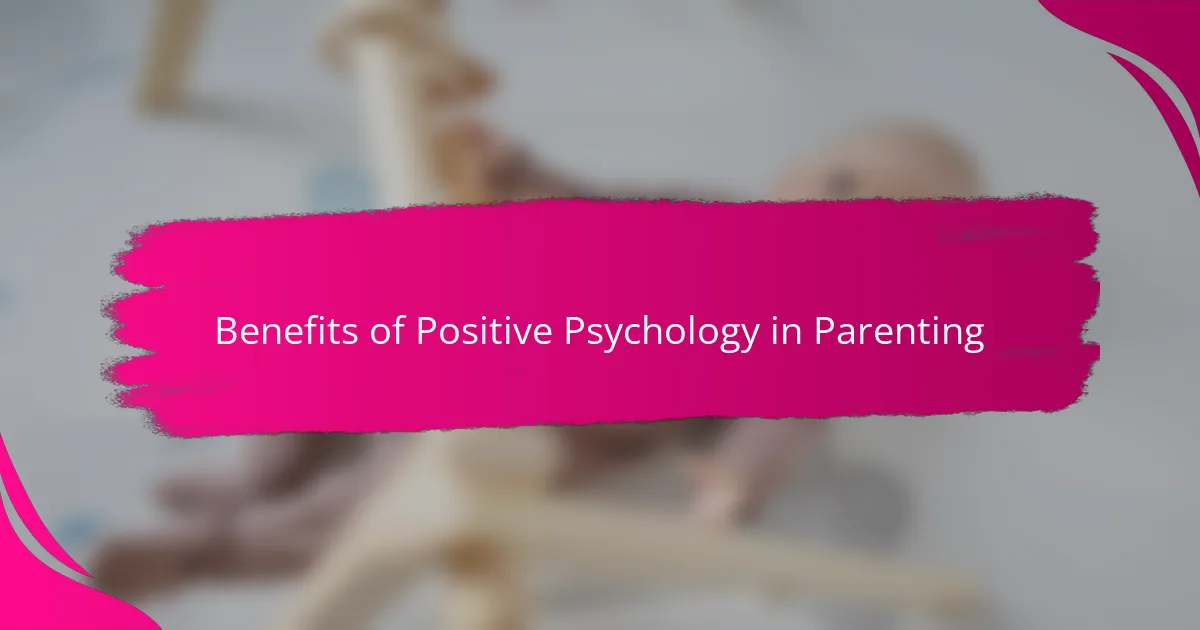
Benefits of Positive Psychology in Parenting
One of the first benefits I noticed was how focusing on strengths boosted my child’s confidence. Instead of dwelling on what went wrong, we celebrated what went right, which made my child feel seen and valued. Isn’t it amazing how a simple “You did great!” can spark a smile and encourage trying again?
I also found that practicing gratitude together created a calmer and happier home environment. When we made it a habit to share what we were thankful for, even the small things, it shifted the mood in subtle but powerful ways. It’s like we built a little shield against stress, simply by appreciating the good around us.
What surprised me most was how positive psychology helped us bounce back faster from setbacks. When mistakes became learning moments rather than failures, frustration lessened and resilience grew. Watching my child face challenges with curiosity instead of fear has been one of the most rewarding parts of this journey.
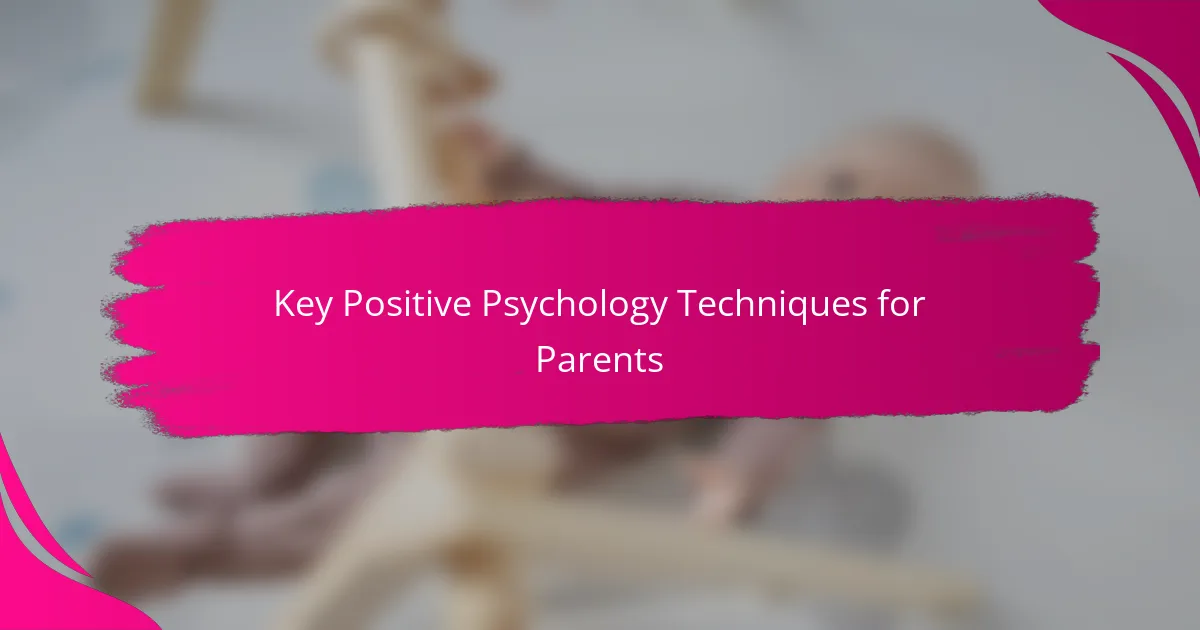
Key Positive Psychology Techniques for Parents
One technique that truly changed the way I connect with my child is practicing active constructive responding—really celebrating their successes with genuine enthusiasm. Instead of a quick “Good job,” I learned to ask questions like, “What part of that made you proud?” This simple shift made my child feel deeply heard and motivated to share more joys and achievements.
Another approach I embraced is framing challenges with a growth mindset. Whenever my child stumbled, I reminded myself to focus on effort and learning rather than results. I’d say things like, “What did you learn from this?” or “How can we try it differently next time?” This helped my child see setbacks not as failures but as stepping stones.
I also made a habit of noticing and verbalizing moments of kindness or courage, even the smallest ones. Praising these qualities didn’t just boost my child’s self-esteem; it created a warm, supportive atmosphere where positive values thrived naturally. Have you tried looking for those little sparks of goodness during your day? It can really brighten the whole family dynamic.
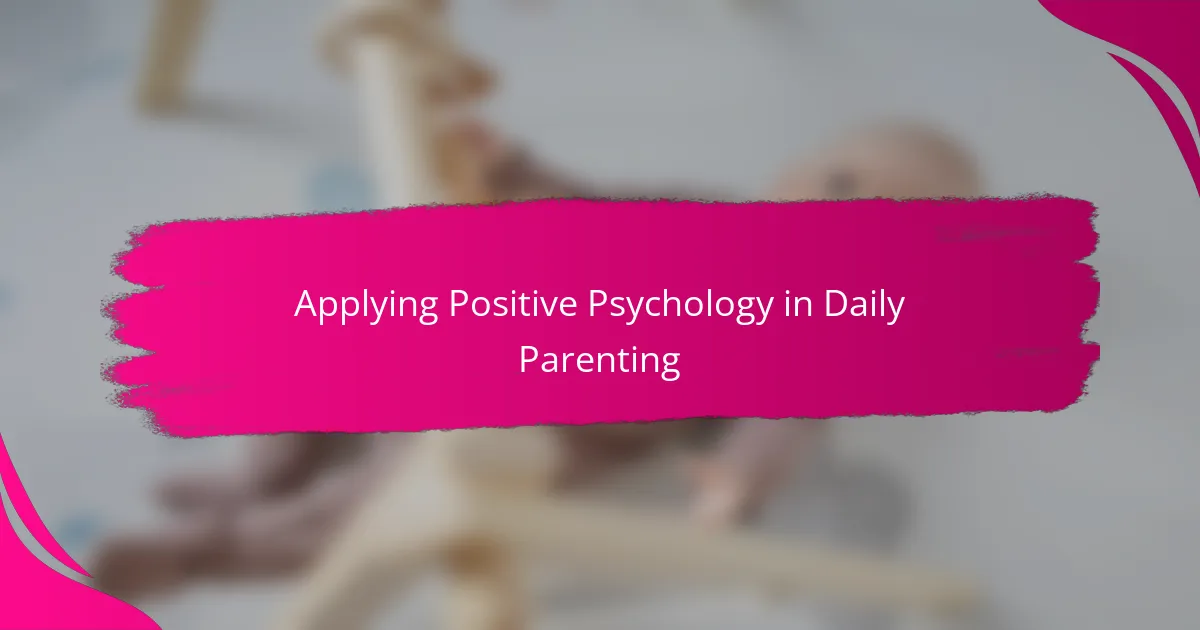
Applying Positive Psychology in Daily Parenting
Bringing positive psychology into our daily parenting routine wasn’t about grand gestures; it was in the small, consistent moments. I started pausing to genuinely acknowledge my child’s efforts, even when the outcome wasn’t perfect. Have you ever noticed how a simple “I see how hard you tried” can change the whole energy in the room? For me, those words became a bridge to deeper connection and motivation.
I found that weaving in gratitude as a daily ritual transformed ordinary dinners into meaningful conversations. Asking “What made you smile today?” often sparked surprising reflections and helped us focus on the day’s positives instead of the usual hustle-and-bustle stress. It felt like creating a little pocket of calm and appreciation in our busy lives.
Sometimes, applying positive psychology meant shifting perspective during tough moments. Instead of reacting with frustration when mistakes happened, I began inviting my child to explore what they learned. That question—“What can we take from this experience?”—became a gentle reminder that challenges are opportunities, not setbacks. It’s amazing how this simple reframing helped both of us stay patient and hopeful.
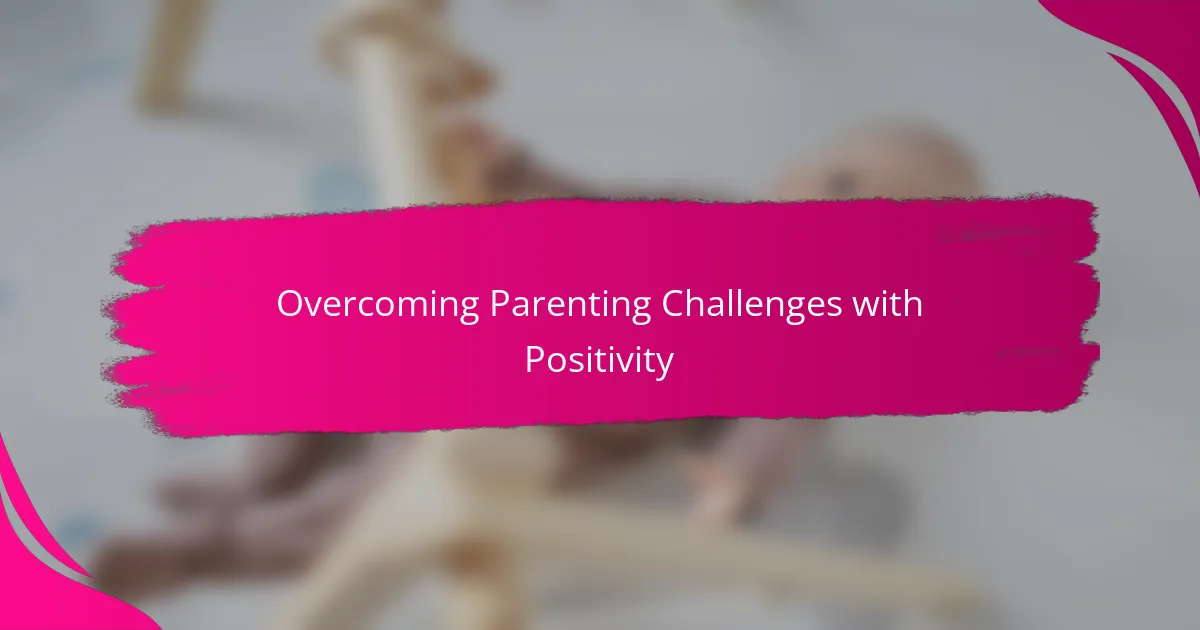
Overcoming Parenting Challenges with Positivity
Facing parenting challenges with a positive mindset has truly reshaped how I respond to difficult moments. Instead of letting frustration take over when my child struggles, I try to pause and focus on what we can learn together. Have you ever found that shifting your outlook turns a tough day into a chance for growth? For me, this approach makes challenges feel less like roadblocks and more like invitations to connect and improve.
I remember a time when tantrums felt overwhelming, and I felt drained. Turning to positivity, I started acknowledging my child’s feelings without judgment and reinforced their efforts to calm down. It wasn’t instant magic, but gradually, those moments became less frequent and more manageable. This taught me that patience, combined with positive reinforcement, can dissolve tension and build resilience in both of us.
What really surprised me was how celebrating small victories—even in chaos—creates a ripple effect of hope and motivation. Praising a calm breath or a kind word, no matter how tiny, sometimes felt like planting seeds in rocky soil. Yet, over time, those little acts of positivity blossomed, proving that even the hardest challenges can be softened by optimism and warmth.
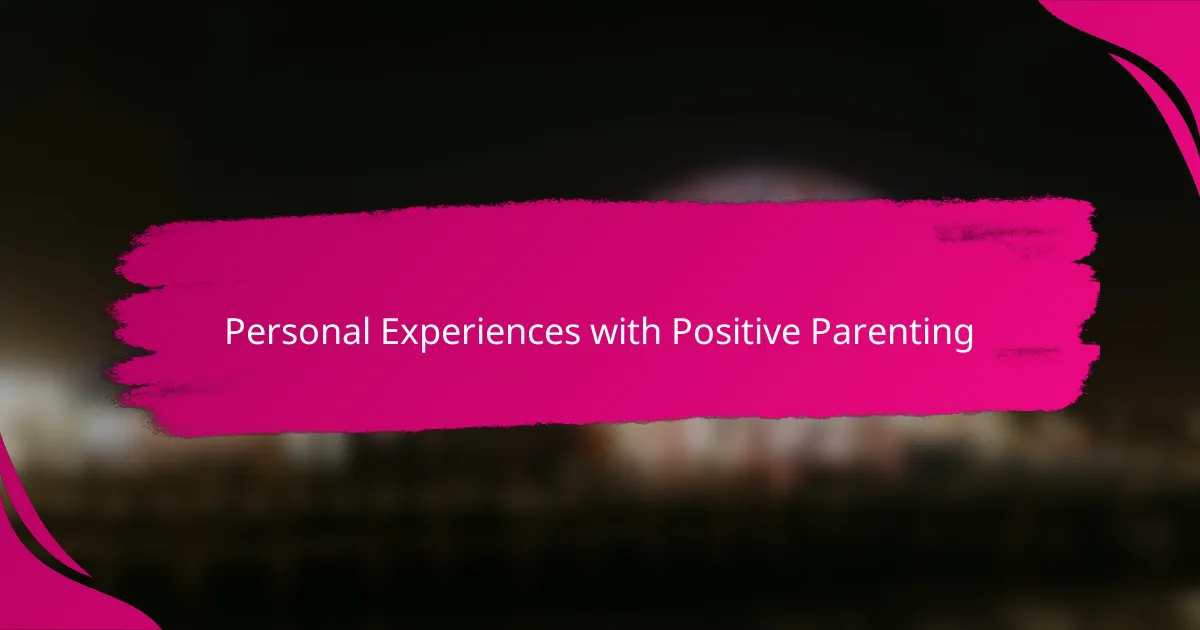
Personal Experiences with Positive Parenting
At first, embracing positive parenting felt like learning a new language. I vividly recall the moment I praised my daughter’s persistence after she struggled with tying her shoes — instead of rushing to fix it, I cheered her efforts, and her face lit up with pride. Have you noticed how that kind of encouragement can transform a frustrating task into a shared celebration?
There were times when I doubted whether this gentle approach would hold up during tantrums or tough days. Yet, by focusing on recognizing her feelings rather than reacting with frustration, I started to see our connection deepen. It’s as if patience and positivity slowly built a bridge over those stormy moments, making the hard parts more manageable for both of us.
What strikes me most is how these small shifts created lasting changes in our home atmosphere. Praising kindness or effort, even when unnoticed by others, seemed to plant seeds of confidence and warmth that grew quietly but steadily. Isn’t it fascinating how the tiniest gestures can shape a child’s view of themselves and the world around them?
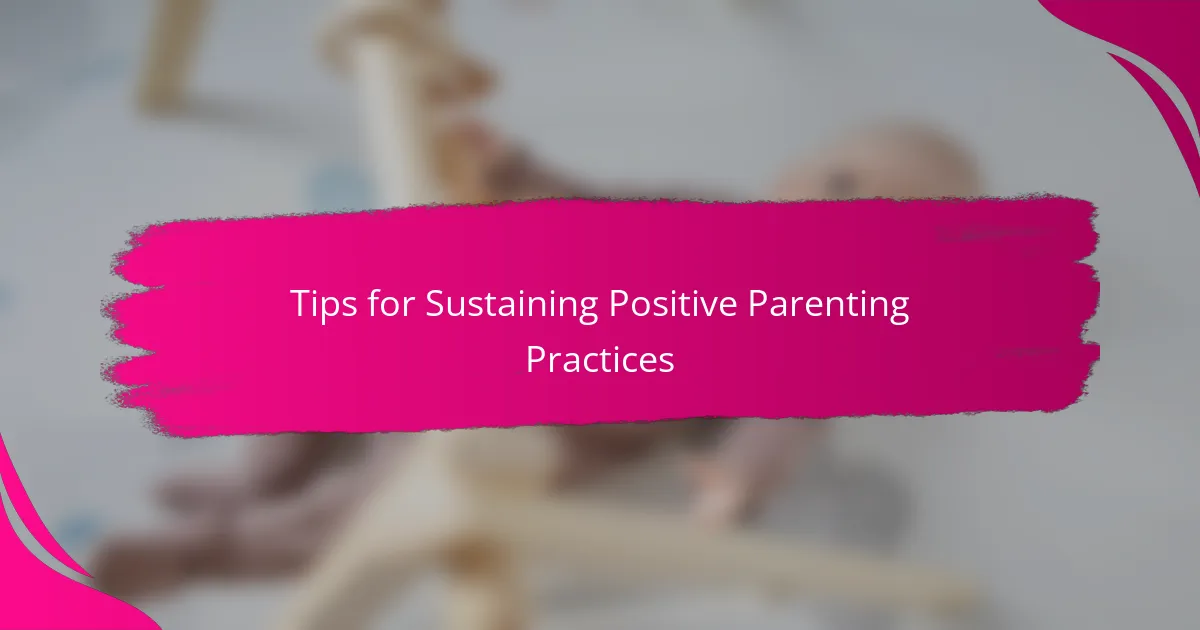
Tips for Sustaining Positive Parenting Practices
Keeping positive parenting practices alive takes more than good intentions; it requires consistency and mindfulness. I found that setting aside a few quiet moments each day to genuinely connect with my child helped me stay centered. Have you ever noticed how a daily habit, like sharing one positive thing from your day, can anchor both you and your child in optimism?
Another tip that worked for me was to be patient with myself when old habits crept back in. Positive parenting isn’t about perfection but progress. I remind myself: If I slip into criticism, I can always pause, breathe, and redirect with kindness. This grace towards myself made sustaining these practices feel doable, not daunting.
Lastly, surrounding ourselves with a supportive community made a huge difference. Whether it’s fellow parents or friends who share similar values, having people to share challenges and victories with created a sense of accountability and encouragement. Have you tried reaching out to others on this journey? For me, knowing I’m not alone has been a powerful boost.
